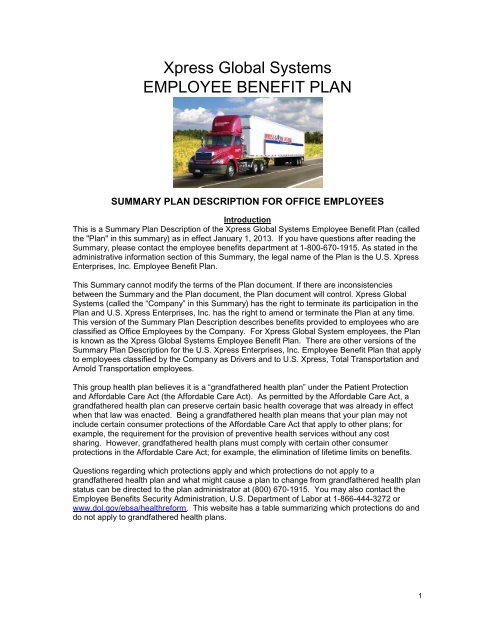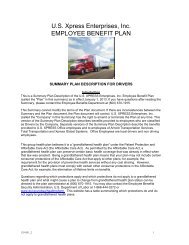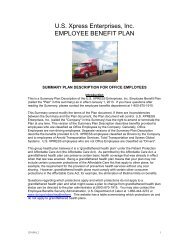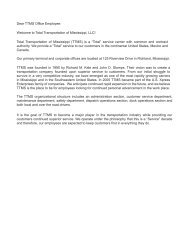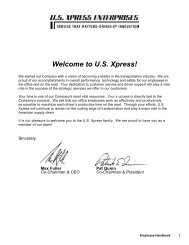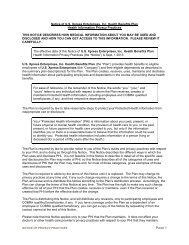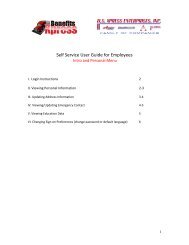2013 XGS Office SPD.pdf - US Xpress
2013 XGS Office SPD.pdf - US Xpress
2013 XGS Office SPD.pdf - US Xpress
Create successful ePaper yourself
Turn your PDF publications into a flip-book with our unique Google optimized e-Paper software.
<strong>Xpress</strong> Global Systems<br />
EMPLOYEE BENEFIT PLAN<br />
SUMMARY PLAN DESCRIPTION FOR OFFICE EMPLOYEES<br />
Introduction<br />
This is a Summary Plan Description of the <strong>Xpress</strong> Global Systems Employee Benefit Plan (called<br />
the "Plan" in this summary) as in effect January 1, <strong>2013</strong>. If you have questions after reading the<br />
Summary, please contact the employee benefits department at 1-800-670-1915. As stated in the<br />
administrative information section of this Summary, the legal name of the Plan is the U.S. <strong>Xpress</strong><br />
Enterprises, Inc. Employee Benefit Plan.<br />
This Summary cannot modify the terms of the Plan document. If there are inconsistencies<br />
between the Summary and the Plan document, the Plan document will control. <strong>Xpress</strong> Global<br />
Systems (called the “Company” in this Summary) has the right to terminate its participation in the<br />
Plan and U.S. <strong>Xpress</strong> Enterprises, Inc. has the right to amend or terminate the Plan at any time.<br />
This version of the Summary Plan Description describes benefits provided to employees who are<br />
classified as <strong>Office</strong> Employees by the Company. For <strong>Xpress</strong> Global System employees, the Plan<br />
is known as the <strong>Xpress</strong> Global Systems Employee Benefit Plan. There are other versions of the<br />
Summary Plan Description for the U.S. <strong>Xpress</strong> Enterprises, Inc. Employee Benefit Plan that apply<br />
to employees classified by the Company as Drivers and to U.S. <strong>Xpress</strong>, Total Transportation and<br />
Arnold Transportation employees.<br />
This group health plan believes it is a “grandfathered health plan” under the Patient Protection<br />
and Affordable Care Act (the Affordable Care Act). As permitted by the Affordable Care Act, a<br />
grandfathered health plan can preserve certain basic health coverage that was already in effect<br />
when that law was enacted. Being a grandfathered health plan means that your plan may not<br />
include certain consumer protections of the Affordable Care Act that apply to other plans; for<br />
example, the requirement for the provision of preventive health services without any cost<br />
sharing. However, grandfathered health plans must comply with certain other consumer<br />
protections in the Affordable Care Act; for example, the elimination of lifetime limits on benefits.<br />
Questions regarding which protections apply and which protections do not apply to a<br />
grandfathered health plan and what might cause a plan to change from grandfathered health plan<br />
status can be directed to the plan administrator at (800) 670-1915. You may also contact the<br />
Employee Benefits Security Administration, U.S. Department of Labor at 1-866-444-3272 or<br />
www.dol.gov/ebsa/healthreform. This website has a table summarizing which protections do and<br />
do not apply to grandfathered health plans.<br />
1
Eligibility<br />
Any employee of the Company or an affiliated business that has adopted the Plan who is required<br />
to work at least 33 hours per week, and who receives W-2 compensation is eligible to participate<br />
in the Plan. A list of the affiliated business(es) that have adopted the Plan is at the end of this<br />
document. Coverage for benefits under the Plan begins on the first day of the month following<br />
completion of 90 days of employment. The company will honor time worked as a contractor or<br />
temporary worker (for <strong>US</strong> <strong>Xpress</strong>) in determining the 1 st of the month following 90 days waiting<br />
period. Employee contributions toward the cost of benefits coverage must begin to be paid one<br />
month in advance of the date that coverage begins, with the first contribution beginning with the<br />
first paycheck on or after the first day of the month following completion of 60 days of<br />
employment. The Company has established a procedure regarding the refund of portions of prepaid<br />
contributions in certain situations minus any amounts owed for taxes or administrative fees<br />
accrued. In certain cases where an individual becomes an employee of the Company (or an<br />
affiliated business that has adopted the Plan) as a result of the Company’s (or affiliated<br />
business’s) acquisition of another business, the employee may be given credit for his or her<br />
service with the acquired business for purposes of determining the effective date of the<br />
employee’s coverage under the Plan. For medical, dental and vision benefits, you may elect to<br />
cover your eligible dependents. Your eligible dependents are the following:<br />
1. Your legal spouse, as determined under the law of the state in which you are a resident.<br />
Domestic partners who are not legal spouses as described above are not eligible for medical<br />
benefits. You will need to provide proof of spousal status.<br />
2. Your or your legal spouse’s biological child, legally adopted child (including children placed<br />
for adoption), step-child, eligible foster children or child for whom you or your legal spouse is<br />
the legal guardian, provided that the child is less than 26 years old and does not have access<br />
to his/her own employer-sponsored health coverage. If you have dependents, you’ll need to<br />
provide proof of dependent status prior to enrolling them. Documentation may include the<br />
appropriate marriage license, birth certificate, or court order. You may also be required to<br />
provide documentation of their continued eligible status from time to time after they are<br />
initially enrolled for coverage.<br />
3. Your or your legal spouse’s child for whom a qualified medical child support order has been<br />
issued.<br />
4. Your or your legal spouse’s unmarried child (as described above) who is, and continues to<br />
be, both (i) incapable of self-sustaining employment by reason of mental retardation or<br />
physical handicap; and (ii) chiefly dependent upon you or your legal spouse for economic<br />
support and maintenance, provided that you furnish proof of such incapacity and dependent<br />
within 30 days of the child’s attainment of the applicable limiting age and subsequently as<br />
may be required. In addition, the child must be a dependent enrolled in the Plan prior to<br />
attaining the applicable limiting age.<br />
Benefit Options<br />
The Benefit Options under the Plan are: medical, dental & vision insurance, short and long-term<br />
disability, AD&D, group term life, dependent care assistance benefits and medical reimbursement<br />
benefits. For all benefits, eligibility begins on the first day of the month following completion of 90<br />
days of full-time (at least 33 hours per week) employment.<br />
Enrollment and Elections<br />
In order to participate in the Plan, you must complete the enrollment process during an enrollment<br />
period. During the enrollment process, you will select the benefits you would like to enroll in and<br />
agree to reduce your pay for each payroll period to pay for your share of the cost of the benefit<br />
elected. <strong>Office</strong> Employees who elect dependent care assistance and/or medical reimbursement<br />
benefits must indicate the amount they want to contribute to their dependent care and/or medical<br />
reimbursement benefit spending account for the Plan Year.<br />
2
The enrollment periods for the Plan are as follows:<br />
1. Initial (New Hire) Enrollment Period: The date you first satisfy the Plan’s eligibility<br />
requirements. This is the first time you may complete the enrollment process.<br />
2. Regular Re-Enrollment Period: The re-enrollment period in the fall of each year. At this time,<br />
an eligible employee or participant may add, change or revoke existing elections. New<br />
elections will be effective at the beginning of the following Plan Year (January 1st). The Plan<br />
Year is January 1 to December 31 of each year. If you wish to add Dependents during the<br />
re-enrollment period, you must submit Dependent Verification.*<br />
3. Special Enrollment Period (Change of Election): The 30 day period following an approved<br />
Change in Status or a Change in Coverage Event. You must complete a Change in Status<br />
form and submit Dependent Verification (if applicable) to the Company within 30 days of the<br />
event.*<br />
* By submitting Dependent Verification, you are acknowledging that you understand the Plan’s<br />
eligibility requirements and certifying that the dependent(s) whom you are enrolling satisfy those<br />
requirements. Falsification of any forms constitutes fraud or an intentional misrepresentation of<br />
material fact and may result in the cancellation of coverage and in your being financially and<br />
legally responsible for any claims paid for an ineligible dependent who was enrolled in the Plan.<br />
Once you have made your election, you are not permitted to change it before the next regular<br />
re-enrollment period, unless you have experienced a qualifying "Change in Status" or other<br />
"Change in Cost/Coverage" event as described in the "Change in Elections" section below.<br />
Termination of Participation<br />
Your participation will terminate if you:<br />
- Terminate employment;<br />
- Retire;<br />
- Become permanently and totally disabled; or<br />
- Transfer to an ineligible employment category;<br />
- Non-payment of benefit premiums within designated timeframe.<br />
Your participation will automatically stop if the Plan is terminated.<br />
Contributions<br />
1. Each payroll period, your employer will reduce your taxable income by your share of the<br />
cost of the medical, dental, vision, medical reimbursement and dependent care<br />
assistance benefits you have elected for the Plan Year. These are pre-tax deductions.<br />
Your contributions for AD&D and group term life, short and long-term disability benefits<br />
are deducted from your pay on a post-tax basis. Your employer will credit the amount to a<br />
separate account to pay for each benefit you select. Employees' share of the cost of<br />
benefits under the Plan is set forth in the Annual Benefit Guide and may be changed by<br />
the Company from time to time. If your share of the cost increases during a Plan Year,<br />
either due to an increase in the cost of the benefit or a decrease in the Company's<br />
contribution toward the cost, your contribution amount will be adjusted automatically. An<br />
amount credited to an account for one benefit cannot be used to pay for another benefit.<br />
2. If the reduction amount exceeds the cost of the benefit, you will not receive money back<br />
at the end of the Plan Year.<br />
3. If you need to go on leave for any reason, you will need to make arrangements to<br />
continue paying premiums for your insurance benefits. Payments should be mailed to:<br />
U.S. <strong>Xpress</strong> Direct<br />
Attention: Benefits Department<br />
4080 Jenkins Rd<br />
Chattanooga, TN 37421<br />
3
4. If you are enrolled in any Allstate Workplace Division supplemental products and you<br />
miss a monthly payment you will then be set up as a self payment through Allstate.<br />
Medical Benefits Medical benefits under the Plan (including prescription drug benefits) are<br />
provided on a self-insured basis by the Company, with claims paid from the general assets of the<br />
Company and by Employees' contributions. Claim payments are paid first from employee<br />
contributions and then, to the extent necessary, from the Company's general assets. The<br />
Company has a contract with Blue Cross Blue Shield of Tennessee, Inc. ("BCBST") to process<br />
claims for medical benefits under the Plan. Two coverage levels are available: standard plan and<br />
premium plan. A detailed description of medical benefits is contained in the "Evidence of<br />
Coverage" document prepared by BCBST, which forms part of this Summary Plan Description.<br />
The Company has delegated to BCBST the exclusive discretionary authority to decide claims for<br />
medical benefits under the Plan, including the right to make final determinations on appeals of<br />
denied claims. BCBST's authority includes the right to make factual determinations with regard to<br />
medical benefits provided under the Plan.<br />
The Company has a contract with Medco/Express Scripts to process claims for prescription drugs<br />
under the Plan under a self-insured arrangement. A detailed evidence of coverage booklet may<br />
be obtained from the Human Resources department by calling the Benefits Department at (800)<br />
670-1915. The Company has delegated to Medco/Express Scripts the exclusive discretionary<br />
authority to decide claims for prescription drug benefits under the Plan, including the right to<br />
make factual determinations with regard to prescription drug benefits under the Plan.<br />
Dental Benefits Dental benefits under the Plan are provided on a fully-insured basis through an<br />
insurance contract issued by Delta Dental Plan of Tennessee ("Delta Dental"). Premiums for<br />
dental coverage are paid solely by the covered employee. The Company does not contribute<br />
toward the cost of dental benefits. A detailed description of dental benefits is contained in the<br />
benefit description document prepared by Delta Dental, which forms part of this Summary Plan<br />
Description and is attached at the end of this Summary. Delta Dental has exclusive discretionary<br />
authority to determine eligibility for coverage under the terms of the insurance contract, based<br />
upon employee information provided by the Company, and to determine whether benefits are<br />
payable under the contract and the amount of such benefits.<br />
Vision Benefits Vision benefits under the Plan are provided on a fully-insured basis through an<br />
insurance contract issued by Vision Service Plan (“VSP”). Premiums for vision coverage are paid<br />
solely by the covered employee. The Company does not contribute toward the cost of vision<br />
benefits. A description of vision benefits is contained in the benefit description document<br />
prepared by VSP, which forms part of this Summary Plan Description and is attached at the end<br />
of this Summary. VSP has exclusive discretionary authority to determine eligibility for coverage<br />
under the terms of the insurance contract, based upon employee information provided by the<br />
Company, and to determine whether any benefits are payable under the contract and the amount<br />
of such benefits.<br />
Long-Term Disability Benefits Long-term disability ("LTD") benefits under the Plan are<br />
provided on a fully-insured basis through an insurance contract issued by Unum. A detailed<br />
description of the LTD benefits is contained in the separate certificate of insurance document<br />
prepared by Unum, which forms part of this Summary Plan Description. Premiums for LTD<br />
coverage are paid solely by the covered employee. Employee contributions are made on an<br />
after-tax basis. Unum has exclusive discretionary authority to determine eligibility for coverage<br />
under the terms of the insurance contract, based upon employee information provided by the<br />
Company, and to determine whether any benefits are payable under the contract and the amount<br />
of such benefits. A brief summary of the LTD benefits is attached at the end of this Summary. A<br />
4
copy of the certificate of insurance coverage may be obtained from the Human Resources<br />
department by calling the Benefits Department at (800) 670-1915.<br />
Short-Term Disability Benefits Short-term disability ("STD") benefits under the Plan are<br />
provided on a fully-insured basis through an insurance contract issued by Unum. A detailed<br />
description of the STD benefits is contained in the separate certificate of insurance document<br />
prepared by Unum, which forms part of this Summary Plan Description. The Company provides<br />
full-time employees with $200 of weekly STD pay (eligible the first day of the month following 90<br />
days of employment). Employees may purchase additional STD benefit from $50 per week to<br />
$950 (maximum of up to 60% of base salary). Employee contributions are made on an after-tax<br />
basis. Unum has exclusive discretionary authority to determine eligibility for coverage under the<br />
terms of the insurance contract, based upon employee information provided by the Company,<br />
and to determine whether any benefits are payable under the contract and the amount of such<br />
benefits. As described in the certificate of insurance, benefits payable under the insurance<br />
contract will be reduced by any benefit payable under any state statutory disability benefit plan. A<br />
brief summary of the STD benefits is attached at the end of this Summary. A copy of the<br />
certificate of insurance coverage may be obtained from the Human Resources department by<br />
calling the Benefits Department at (800) 670-1915.<br />
Accidental Death and Dismemberment Benefits Accidental death and dismemberment<br />
("AD&D") benefits under the Plan are provided on a fully-insured basis through an insurance<br />
contract issued by Unum. AD&D coverage is available on a voluntary basis and premiums for<br />
AD&D coverage are paid entirely by the covered employee on an after-tax basis. A detailed<br />
description of AD&D benefits is contained in the certificate of insurance document prepared by<br />
Unum, which forms part of this Summary Plan Description. Unum has exclusive discretionary<br />
authority to determine eligibility for coverage under the insurance contract, based upon employee<br />
information provided by the Company, and to determine whether any benefits are payable under<br />
the contract and the amount of such benefits. A copy of the certificate of insurance coverage may<br />
be obtained from the Human Resources department by calling the Benefits Department at (800)<br />
670-1915.<br />
Group Term Life Benefits The Plan provides basic group term life insurance benefits as well as<br />
voluntary supplemental group term life insurance benefits on a fully-insured basis through<br />
contracts issued by Unum. Premiums for $10,000 of basic group term life insurance on the<br />
employee’s life are paid entirely by the Company. Basic group life insurance is effective beginning<br />
the first day of the month following 90 days of employment. Voluntary supplemental group term<br />
life insurance is available on a voluntary basis and premiums are paid entirely by the covered<br />
employee. Voluntary supplemental coverage is available for the employee as well as the<br />
employee's dependents. A detailed description of group term life benefits is contained in the<br />
certificate of insurance documents prepared by Unum, which form part of this Summary Plan<br />
Description. Unum has exclusive discretionary authority to determine eligibility for coverage under<br />
the insurance contracts, based upon employee information provided by the Company, and to<br />
determine whether any benefits are payable under the contracts and the amount of such benefits.<br />
Please note that voluntary supplemental coverage for the employees' spouses and dependents is<br />
not provided through the Plan's Internal Revenue Code section 125 provisions. Employee<br />
contributions are made on an after-tax basis. A brief summary of the basic and supplemental life<br />
benefits is attached at the end of this Summary. A copy of the certificate of the certificate of<br />
insurance coverage may be obtained from the Human Resources department by calling the<br />
Benefits Department at (800) 670-1915.<br />
Dependent Care Assistance and Medical Reimbursement Benefits Dependent care<br />
assistance and medical reimbursement benefits are available to <strong>Office</strong> Employees. <strong>Office</strong><br />
Employees who elect dependent care assistance and/or medical reimbursement benefits must<br />
specify the amount they would like to contribute for such benefits on a pre-tax basis. Enrollments<br />
in these benefits are only allowed during open enrollment following 90 days of employment. The<br />
5
Company has a contract with PayFlex Systems <strong>US</strong>A, Inc. to process claims for dependent care<br />
and medical reimbursement benefits. A detailed description of dependent care assistance and<br />
medical reimbursement benefits is contained in the separate summary of dependent care and<br />
medical reimbursement benefits document, which forms part of this Summary Plan Description<br />
for <strong>Office</strong> Employees. A copy of the detailed summary may be obtained from the Human<br />
Resources department by calling the Benefits Department at (800) 670-1915.<br />
Changes in Elections<br />
Due to Internal Revenue Service regulations, your benefit elections must remain in effect until the<br />
beginning of the next Plan Year (the following January 1). As explained previously, each Fall,<br />
there will be a regular re-enrollment period during which you can make elections for the next Plan<br />
Year. The only times you are permitted to make an election change before the next Plan Year<br />
are:<br />
- if there is a “Change in Status” and your election change complies with the Consistency rule.<br />
- if there is a qualified “Change in Cost / Coverage” event.<br />
- you must complete a Change in Status/ Election form within 30 days of the event(s) and the<br />
Company must approve the change.<br />
Change in Status Events<br />
1. Change in employee’s legal marital status– Including marriage, divorce, death of spouse,<br />
legal separation, and annulment.<br />
2. Change in number of dependents– Including birth, adoption, placement for adoption, and<br />
death. (Must be a tax dependent)<br />
3. Change in employment status– Employment status change of the employee, spouse, or tax<br />
dependent. Commencement or termination of employment; strike or lockout; return from<br />
unpaid leave of absence; promotion or demotion, change in worksite affecting benefits;<br />
employment status change with the consequence that the individual becomes (or ceases to<br />
be) eligible under the plan.<br />
4. Dependent satisfies (or ceases to satisfy) eligibility requirements –An event that causes<br />
a tax dependent to satisfy or cease to satisfy the requirements for coverage due to attainment<br />
of age, gain or loss of student status, marriage or any similar circumstance.<br />
5. Residence change - A change in the place of residence of an employee, spouse or tax<br />
dependent if the change in residence affects the eligibility for coverage.<br />
Consistency Rules<br />
1. General consistency rule- In order to change an election due to a “Change in Status” the<br />
election change must be on account of and correspond with a change in status event that<br />
affects coverage eligibility of the employee, spouse or dependent under an employer’s plan.<br />
2. Special consistency rule for loss of dependent eligibility– If the change in status is the<br />
employee’s divorce, annulment or legal separation from a spouse, the death of a spouse or<br />
dependent, or a dependent’s ceasing to satisfy the eligibility requirements for coverage, then<br />
the employee can cancel accident or health insurance coverage for only the spouse or<br />
dependent, as applicable.<br />
3. Consistency rule for gain of coverage eligibility under another employer plan- If an<br />
employee, spouse or dependent gains eligibility for coverage under another employer’s plan<br />
(or qualified benefit) as a result of a change in marital status or a change in employment<br />
status, then an employee’s election under the plan to cease or decrease coverage for that<br />
individual under the plan corresponds with that change in status only if coverage for that<br />
individual becomes effective or is increased under the other employer’s plan.<br />
Change in Cost/Coverage<br />
1. Significant Cost Increase– If the cost of a benefit package option significantly increases<br />
during a Plan Year, you may revoke your elections and, in lieu thereof, elect to receive on a<br />
prospective basis coverage under another benefit package option providing similar coverage.<br />
Dropping coverage altogether is not allowed.<br />
6
2. Significant Curtailment of Coverage– If the coverage under a benefit option is significantly<br />
curtailed or ceases during a Plan Year, affected employees may revoke their elections under<br />
that benefit option and make a new election for coverage under another benefit package<br />
option providing similar coverage. IRS regulations provide that coverage under an accident or<br />
health plan is significantly curtailed “only if there is an overall reduction in coverage provided<br />
to participants under the plan so as to constitute reduced coverage to participants generally”.<br />
A single provider leaving a network of providers would not permit an election change.<br />
3. Addition or Elimination of Benefit Package Option– If during a Plan Year, the Plan adds a<br />
new coverage option (or eliminates an existing option) affected employees may elect the<br />
newly-added option (or elect another option if an option has been eliminated) prospectively<br />
and make a corresponding election change with respect to other benefit options providing<br />
similar coverage.<br />
4. Change in Coverage of Spouse or Dependent Under Other Employer’s Plan - An<br />
employee may make a prospective election change that is on account of and corresponds<br />
with a change made under the plan of the spouse’s, former spouse’s or dependent’s<br />
employer if: (1) an Internal Revenue Code section 125 plan or qualified benefits plan of the<br />
spouse’s, former spouse’s or dependent’s employer permits participants to make election<br />
change that would be permitted under the regulations; or (2) the other employer’s plan<br />
permits participants to make an election for a period of coverage that is different from the<br />
period of coverage under this Plan.<br />
5. FMLA Leaves– An employee taking leave under FMLA may revoke an existing election of<br />
group health plan coverage and make such other election for the remaining portion of period<br />
of coverage as may be provided for under FMLA.<br />
6. HIPAA Special Enrollment Rights– An employee may change his/her election for group<br />
health plan coverage under the Plan to the extent that the election change corresponds with<br />
special enrollment rights under HIPAA.<br />
7. COBRA– An employee may increase his/her pre-tax contributions for coverage under the<br />
Plan if a COBRA event (or similar state law continuation coverage event) occurs with respect<br />
to the employee, the employee’s spouse or dependent.<br />
8. Judgment, Decree or Orders (QMCSO)- If there is a judgment, decree, or order resulting<br />
from divorce, legal separation, annulment or change in legal custody that requires accident or<br />
health coverage for an employee’s child or dependent foster child, then the employee may<br />
change his/her election to add or drop coverage consistent with the order.<br />
9. Entitlement to Medicare or Medicaid– Medicare or Medicaid entitlement or loss of<br />
entitlement may allow an employee to make an election change.<br />
HIPAA NOTICE OF PRIVACY PRACTICES<br />
THIS NOTICE DESCRIBES HOW MEDICAL INFORMATION ABOUT YOU MAY BE <strong>US</strong>ED<br />
AND DISCLOSED AND HOW YOU CAN GET ACCESS TO THIS INFORMATION.<br />
PLEASE REVIEW IT CAREFULLY.<br />
The Health Insurance Portability and Accountability Act of 1996 (HIPAA) imposes numerous<br />
requirements on employer health plans concerning the use and disclosure of protected health<br />
information. This portion of the Summary Plan Description is a Notice that describes the privacy<br />
practices of the Plan and your legal rights under HIPAA regarding your protected health<br />
information held by the Plan. Among other things, this Notice describes how your protected<br />
health information may be used or disclosed to carry out treatment, payment, or health care<br />
operations, or for any other purposes that are permitted or required by law. This Notice applies to<br />
your medical (including prescription drug) benefits, dental benefits, vision benefits and medical<br />
reimbursement benefits under the Plan.<br />
How the Plan May Use Your Information<br />
The Plan is permitted by law to use and disclose your personal medical information (called<br />
“Protected Health Information”) in certain ways without your authorization:<br />
7
For treatment: So that you receive appropriate treatment and care, the Plan may disclose your<br />
Protected Health Information to coordinate or manage your health care services. For example,<br />
the Plan might disclose information about your prior prescriptions to a pharmacist to determine if<br />
prior prescriptions would cause a problem with a new prescription.<br />
For payment: To make sure that claims are paid accurately and you receive the correct benefits,<br />
the Plan may use and disclose your Personal Health Information to determine plan eligibility and<br />
responsibility for coverage and benefits. For example, the Plan may use your information to<br />
confer with other health plans to resolve a coordination of benefits issue. The Plan may also use<br />
your Personal Health Information for utilization review activities.<br />
For health care operations: To ensure quality and efficient plan operations, the Plan may use<br />
your Personal Health Information in several ways, including plan administration, quality<br />
assessment and improvement, and vendor review. Your information could be used, for example,<br />
to assist in the evaluation of a vendor who supports the Plan. The Plan may contact you to<br />
provide information about treatment alternatives or other health-related benefits and services<br />
available under the Plan.<br />
To Business Associates: The Plan may contract with individuals or entities known as Business<br />
Associates to perform various functions involving Protected Health Information on the Plan’s<br />
behalf or to provide certain types of services for the Plan.<br />
As Required by Law: The Plan may disclose your Protected Health Information when required<br />
to do so by federal, state or local law.<br />
To Avert a Serious Threat to Health or Safety: The Plan may use and disclose your Protected<br />
Health Information when necessary to prevent a serious threat to your health and safety, or the<br />
health and safety of the public or another person.<br />
Organ and Tissue Donation: If you are an organ donor, the Plan may release your Protected<br />
Health Information to organizations that handle organ procurement or organ, eye, or tissue<br />
transplantation or to an organ donation bank, as necessary to facilitate organ or tissue donation<br />
and transplantation.<br />
Military and Veterans: If you are a member of the armed forces, the Plan may release your<br />
Protected Health Information as required by military command authorities.<br />
Workers' Compensation: The Plan may release your Protected Health Information for workers'<br />
compensation or similar programs.<br />
Public Health Risks: The Plan may disclose your Protected Health Information for public health<br />
actions, such as to prevent or control disease or to report abuse, neglect or domestic violence.<br />
Health Oversight Activities: The Plan may disclose your Protected Health Information to a<br />
health oversight agency for activities authorized by law (for example, audits, investigations,<br />
inspections, and licensure).<br />
Lawsuits and Disputes: If you are involved in a lawsuit or a dispute, the Plan may disclose your<br />
Protected Health Information in response to a court or administrative order, or in response to a<br />
subpoena, discovery request, or other lawful process by someone else involved in the dispute,<br />
but only if efforts have been made to tell you about the request or to obtain an order protecting<br />
the information requested.<br />
Law Enforcement: The Plan may disclose your Protected Health Information if asked to do so by<br />
a law enforcement official (for example, to identify a suspect or missing person).<br />
Coroners, Medical Examiners and Funeral Directors: The Plan may release your Protected<br />
Health Information to a coroner or medical examiner.<br />
National Security and Intelligence Activities: The Plan may release your Protected Health<br />
Information to authorized federal officials for intelligence, counterintelligence, and other national<br />
security activities authorized by law.<br />
Inmates: If you are an inmate of a correctional institution or are in the custody of a law<br />
enforcement official, the Plan may disclose your Protected Health Information to the correctional<br />
institution or law enforcement official if necessary for the institution to provide you with health<br />
care, to protect your health and safety or the health and safety of others, for the safety and<br />
security of the correctional institution.<br />
Research: The Plan may disclose your Protected Health Information to researchers when the<br />
individual identifiers have been removed or when an institutional review board or privacy board<br />
8
has reviewed the research proposal and established protocols to ensure the privacy of the<br />
requested information and approves the research.<br />
Plan Sponsor: The Plan may disclose your Protected Health Information to U.S. <strong>Xpress</strong><br />
Enterprises, Inc. (the plan sponsor) in connection with these activities and other plan<br />
administration activities. Employees in the following positions may have access to your protected<br />
health information for plan administration purposes: Benefits Department; Privacy <strong>Office</strong>r; Privacy<br />
Manager; Employee Relations Department; Vice President and Legal Counsel; and Vice<br />
President of Human Resources. If you are covered under an insured health plan, the insurer also<br />
may disclose Protected Health Information to the plan sponsor in connection with payment,<br />
treatment or health care operations.<br />
Other Purposes Permitted or Required by Law: The Plan may disclose your Protected Health<br />
Information for other purposes required by law, provided that the use or disclosure is limited to<br />
the relevant requirements of such law.<br />
In Special Situations: The Plan may disclose your Protected Health Information to a family<br />
member, relative, close personal friend, or any other person whom you identify, when that<br />
information is directly relevant to the person's involvement with your care or payment related to<br />
your care. The Plan also may use your Protected Health Information to notify a family member,<br />
your personal representative, another person responsible for your care, or certain disaster relief<br />
agencies of your location, general condition, or death. If you are incapacitated, there is an<br />
emergency, or you otherwise do not have the opportunity to agree to or object to this use or<br />
disclosure, the Plan will do what in the administrator's judgment is in your best interest regarding<br />
such disclosure and will disclose only information that is directly relevant to the person's<br />
involvement with your health care. The Plan will make other uses and disclosures only after you<br />
authorize them in writing. You may revoke your authorization in writing at any time.<br />
Your Rights Regarding Protected Health Information<br />
You have the right to:<br />
• Inspect and copy your Protected Health Information<br />
• If the Plan uses electronic health records, you have the right to obtain an electronic copy<br />
of the Protected Health Information in the record and, if you so choose, the Protected<br />
Health Information will be transmitted directly to an entity or person you specify, provided<br />
your directive is clear, conspicuous and specific<br />
• Request that your Protected Health Information be amended or corrected if inaccurate<br />
• Receive an accounting of certain disclosures of your information made by the Plan; you<br />
are not entitled to an accounting of several types of disclosures, including, but not limited<br />
to:<br />
― Disclosures made for payment, treatment or health care operations<br />
― Disclosures made to you<br />
― Disclosures made to friends or family in your presence or because of an emergency<br />
― Disclosures for national security purposes― Disclosures you authorized in writing<br />
― Disclosures made before April 14, 2003<br />
― Disclosures incidental to otherwise permissible disclosures.<br />
• Receive a paper copy of this notice, even if you agreed to receive it electronically.<br />
Right to Request Restrictions<br />
You may ask the Plan to restrict how it uses and discloses your Protected Health Information as it<br />
carries out payment, treatment, or health care operations. You may also ask the Plan to restrict<br />
disclosures to your family members, relatives, friends, or other persons you identify who are<br />
involved in your care or payment for your care. However, the Plan is not required to agree to<br />
these requests.<br />
Right to Request Confidential Communications<br />
You may request to receive your Protected Health Information by alternative means or at an<br />
alternative location if you reasonably believe that other disclosure could pose a danger to you.<br />
9
For example, you may only want to have information sent by mail or to an address other than<br />
your home.<br />
For more information about exercising these rights, contact the office below.<br />
Right to Be Notified of a Breach<br />
You have the right to be notified in the event that the Plan or a Business Associate of the Plan<br />
discovers a breach involving your unsecured protected health information.<br />
Complaints<br />
If you believe that your privacy rights have been violated, you may file a written complaint without<br />
fear of reprisal. Direct your complaint to the office listed below under “Contacting Us” or to the<br />
Secretary of Health and Human Services, Hubert H. Humphrey Building, 200 Independence<br />
Avenue, SW, Washington, DC 20201.<br />
About this Notice<br />
The Plan is required by law to maintain the privacy of Protected Health Information and to provide<br />
individuals with notice of its legal duties and privacy practices with respect to Protected Health<br />
Information. The Plan is required to abide by the terms of this Notice. The Plan reserves the<br />
right to change the terms of this Notice and to make the new notice provisions effective for all<br />
Protected Health Information it maintains. If this Notice is changed, you will receive a new notice<br />
via mail.<br />
Contacting Us<br />
You may exercise the rights described in this notice by contacting the U.S. <strong>Xpress</strong> office identified<br />
below, which will provide you with additional information. The contact is:<br />
Amanda Thompson<br />
Sr. Director, Compensation & Benefits<br />
Human Resources Department<br />
(800) 251-6291 x 3491<br />
NOTICE OF RIGHTS TO CONTINUE GROUP HEALTH COVERAGE<br />
This section of the Summary Plan Description is your notice of continuation coverage rights under<br />
the Consolidated Omnibus Budget Reconciliation Act of 1985 ("COBRA"). COBRA continuation<br />
coverage can become available to you and to your spouse and dependent children, if they are<br />
covered under the Plan when you would otherwise lose your group health coverage. Under the<br />
Plan, COBRA continuation coverage rights apply to medical (including prescription drug), vision and<br />
dental benefits and also apply on a limited basis to medical reimbursement benefits. COBRA<br />
continuation coverage is a continuation of Plan coverage when coverage would otherwise end<br />
because of a life event known as a "qualifying event." Specific qualifying events are listed later in this<br />
notice. COBRA continuation coverage must be offered to each person who is a "qualified<br />
beneficiary." A qualified beneficiary is someone who will lose coverage under the Plan because of a<br />
qualifying event. Depending on the type of qualifying event, employees, spouses of employees, and<br />
dependent children of employees may be qualified beneficiaries. Under the Plan, qualified<br />
beneficiaries who elect COBRA continuation coverage must pay for COBRA continuation coverage.<br />
If you are an employee covered under the Plan, you have a right to choose this continuation<br />
coverage if you lose your group health coverage because of a reduction in your hours of employment<br />
or the termination of your employment (for reasons other than gross misconduct on your part). If you<br />
are the spouse of an employee covered by the Plan, you have the right to choose continuation<br />
coverage for yourself if you lose group health coverage under the Plan for any of the following four<br />
reasons:<br />
1) The death of your spouse;<br />
2) A termination of your spouse's employment (for reasons other than gross misconduct) or a<br />
reduction in your spouse's hours of employment;<br />
3) Divorce or legal separation from your spouse; or<br />
10
4) Your spouse becomes entitled to Medicare.<br />
In the case of a dependent child of an employee covered by the Plan, he or she has the right to<br />
continuation coverage if group health coverage under the Plan is lost for any of the following five<br />
reasons:<br />
1) The death of a parent;<br />
2) A termination of a parent's employment (for reasons other than gross misconduct) or reduction in<br />
a parent’s hours of employment;<br />
3) Parent’s divorce or legal separation;<br />
4) A parent becomes entitled to Medicare; or<br />
5) The dependent child ceases to be a "dependent child" under the U.S. <strong>Xpress</strong> Inc. Employee<br />
Benefit Plan.<br />
Furthermore, a child born to, or placed for adoption with, the covered employee during the period of<br />
continuation coverage may also become covered as a qualified beneficiary.<br />
Under the law, the employee or a family member has the responsibility to inform the Plan<br />
Administrator of a divorce, legal separation, or a child losing dependent status under the Plan within<br />
60 days of the date of the event or the date in which coverage would end under the Plan because of<br />
the event, whichever is later. The Company has the responsibility to notify the Plan Administrator of<br />
the employee's death, termination, and reduction in hours of employment or Medicare entitlement.<br />
When the Plan Administrator is notified that one of these events has happened, the Plan<br />
Administrator will in turn notify you that you have the right to choose continuation coverage. Under<br />
the law, you have at least 60 days from the date you would lose coverage because of one of the<br />
events described above, or the date notice of your election rights is sent to you, whichever is later, to<br />
inform the Plan Administrator that you want continuation coverage. If you do not choose continuation<br />
coverage, your group health insurance coverage will end. Also, if you do not become re-employed<br />
within 63 days of your termination of employment, and you have not chosen continuation coverage,<br />
you may lose prior coverage credit toward pre-existing condition limitation periods when you next<br />
become insured.<br />
If you choose continuation coverage, the Company is required to give you coverage which, as of the<br />
time coverage is being provided, is similar to the coverage provided under the plan to similarly<br />
situated employees or family members. The law requires that you be afforded the opportunity to<br />
maintain continuation coverage for 36 months unless you lost group health coverage because of a<br />
termination of employment or reduction in hours. In that case, the required continuation coverage<br />
period is 18 months. This18 months may be extended to 36 months if other events (such as a death,<br />
divorce, legal separation, or Medicare entitlement) occur during that 18-month period. If a second<br />
qualifying event occurs, you must make sure that the Plan Administrator is notified of the second<br />
qualifying event within 60 days of the second qualifying event. Continuation coverage for medical<br />
reimbursement benefits is only available through the end of the Plan Year in which the qualifying<br />
event occurs.<br />
The 18 months may be extended to 29 months for an individual, and his/her qualified dependents, if<br />
the individual is determined to be disabled (for Social Security disability purposes) at the time of the<br />
qualifying event or at any time during the first 60 days of continuation coverage, and the Plan<br />
Administrator is notified of that determination within 60 days of the date of the determination and<br />
before the end of the 18-month period. The affected individual must also notify the Plan Administrator<br />
within 30 days of any final determination that the individual is no longer disabled. In no event will<br />
continuation coverage last beyond 3 years from the date of the event that originally made a qualified<br />
beneficiary eligible to elect coverage.<br />
However, the law also provides that your continuation coverage may be terminated before the end of<br />
the maximum period for any of the following five reasons:<br />
11
(1) The Company no longer provides group health coverage to any of its employees<br />
(2) You do not pay the premium for your continuation coverage on time<br />
(3) You become covered under another group health plan after the date of your COBRA<br />
election, unless that plan contains any exclusions or limitations with respect to any preexisting<br />
conditions you or your covered dependents may have<br />
(4) You become entitled to Medicare after the date of your COBRA election<br />
(5) You extended coverage for up to 29 months due to your disability and there has been a<br />
final determination that you are no longer disabled.<br />
You do not have to show that you are insurable to choose continuation coverage.<br />
In order to protect your family's rights, you should keep the Plan Administrator informed<br />
of any changes in the addresses of family members. You should also keep a copy, for your<br />
records, of any notices you send to the Plan Administrator.<br />
Maternity and Newborn Coverage<br />
Your Plan provides maternity and newborn infant coverage. Federal law generally prohibits this<br />
Plan from restricting benefits for any hospital length of stay in connection with childbirth for the<br />
mother or newborn child to less than 48 hours following a normal vaginal delivery, or less than 96<br />
hours following a cesarean section. Federal law also generally prohibits the Plan from requiring<br />
that a Provider obtain authorization to prescribe a length of stay in excess of the above periods.<br />
Please refer to the Covered Services section of the BlueCross BlueShield of Tennessee<br />
Evidence of Coverage document for details.<br />
Qualified Medical Child Support Order<br />
In accordance with section 609(a) of ERISA, the Plan will provide health benefit coverage to a<br />
child of a participant in accordance with the terms of any medical child support order that the Plan<br />
Administrator determines to be a "qualified medical child support order." A qualified medical child<br />
support order is a judgment, decree or order issued by a court, which provides for child support or<br />
health benefit coverage relating to benefits under the Plan and which meets certain requirements<br />
regarding substance and form. Medical child support orders should be submitted to the Plan<br />
Administrator, who will promptly notify the involved individuals of its receipt of the order and of the<br />
Plan's procedure for determining whether the order is a qualified order. You may request a copy<br />
of the Plan's procedure for determining whether an order is a qualified medical child support order<br />
from the Human Resources Department.<br />
Certificate of Creditable Coverage<br />
A certificate of creditable coverage is a document that reports the period of time that you and/or a<br />
dependent have had medical benefits coverage under the Plan without a significant break in<br />
coverage. This information may be helpful if you or a dependent become covered under a group<br />
health plan other than the Plan and that other group health plan contains a preexisting condition<br />
limitation. Under Federal law, your coverage or your dependent’s coverage under this Plan may<br />
reduce or eliminate the application of the other plan’s preexisting condition limitation.<br />
A certificate of creditable coverage will be provided automatically when your coverage or your<br />
dependent’s coverage under the Plan terminates. You or your dependent also have the right to<br />
request a certificate of creditable coverage from the Plan at any time, as long as your request is<br />
made within 24 months after your coverage or your dependent’s coverage under the Plan<br />
terminates. Requests should be directed to the Human Resources Benefits Department at1-800-<br />
670-1915.<br />
Medicaid-Eligible Individuals<br />
In determining whether an individual is eligible for health benefit coverage and is making benefit<br />
payments, the Plan will not take into account the fact that an individual is eligible for or is covered<br />
by Medicaid.<br />
12
In addition, the Plan will make benefit payments in accordance with any assignment of rights<br />
made by or on behalf of an individual as required by a state Medicaid program and in accordance<br />
with any state law which provides that the state has acquired rights to payment with respect to a<br />
participant.<br />
Mastectomy Benefit Coverage<br />
Under Federal law, group health plans, insurance companies, and health maintenance<br />
organizations (HMOs) that provide coverage for medical and surgical benefits for mastectomy<br />
must also provide coverage for reconstructive surgery in a manner determined in consultation<br />
with the attending physician and the patient.<br />
Required coverage includes reconstruction of the breast on which the mastectomy was<br />
performed, surgery and reconstruction of the other breast to produce a symmetrical appearance,<br />
and prostheses and treatment of physical complications at all stages of the mastectomy, including<br />
lymphedemas. These benefits are subject to the normal deductible and coinsurance provisions<br />
that apply to other benefits under your coverage.<br />
Statement of Rights<br />
As a participant in the Plan, you are entitled to certain rights and protections under the Employee<br />
Retirement Income Security Act of 1974 (ERISA). ERISA provides that all Plan participants be<br />
entitled to:<br />
Receive Information About Your Plan and Benefits.<br />
Examine, without charge, at the Plan Administrator's office and at other specific locations all<br />
documents governing the Plan including insurance contracts and a copy of the latest annual<br />
report (Form 5500) filed by the Plan with the U.S. Department of Labor and available at the Public<br />
Disclosure Room of the Pension and Welfare Benefit Administration.<br />
Obtain upon written request to the Plan Administrator, copies of documents governing the<br />
operation of the Plan, including insurance contracts and copies of the latest annual report (Form<br />
5500) and updated summary plan description. The Plan Administrator may make a reasonable<br />
charge for the copies.<br />
Receive a summary of the Plan's annual financial report. The Plan Administrator is required by<br />
law to furnish you with a copy of this summary annual report.<br />
Continue Group Health Plan Coverage.<br />
Continue health care coverage for yourself, spouse or dependents if there is a loss of coverage<br />
under the Plan as a result of a qualifying event. You or your dependents may have to pay for<br />
such coverage. Review this summary plan description and the documents governing the Plan on<br />
the rules governing your COBRA continuation coverage rights.<br />
Reduction or elimination of exclusionary periods of coverage for preexisting conditions under your<br />
group health plan, if you have creditable coverage from another plan. You should be provided a<br />
certificate of creditable coverage, free of charge, from your group health plan or health insurance<br />
issuer when you lose coverage under the plan, when you become entitled to elect COBRA<br />
continuation coverage, when your COBRA continuation coverage ceases, if you request it before<br />
losing coverage, or if you request it up to 24 months after losing coverage. Without evidence of<br />
creditable coverage, you may subject to a preexisting condition exclusion for 12 months (18<br />
months for late enrollees) after your enrollment date in your coverage.<br />
Prudent Actions by Plan Fiduciaries.<br />
In addition to creating rights for Plan participants, ERISA imposes duties upon the people who are<br />
responsible for the operation of the employee benefit plan. The people who operate your Plan,<br />
called "fiduciaries" of the Plan, have a duty to do so prudently and in the interest of you and other<br />
Plan participants and beneficiaries. No one, including your employer or any other person, may<br />
13
fire you or otherwise discriminate against you in any way to prevent you from obtaining a welfare<br />
benefit or exercising your rights under ERISA.<br />
Enforce Your Rights.<br />
If your claim for a welfare benefit is denied or ignored, you have a right to know why this was<br />
done, to obtain copies of documents relating to the decision without charge, and to appeal any<br />
denial, all within certain time schedules.<br />
Under ERISA, there are steps you can take to enforce the above rights. For instance, if you<br />
request a copy of Plan documents or the latest annual report from the Plan and do not receive<br />
them within 30 days, you may file suit in a Federal court. In such a case, the court may require<br />
the Plan Administrator to provide the materials and pay you up to $110 a day until you receive the<br />
materials, unless the materials were not sent because of reasons beyond the control of the Plan<br />
Administrator. If you have a claim for benefits which is denied or ignored, in whole or in part, you<br />
may file suit in a state or federal court, provided that you have exhausted your administrative<br />
appeal rights. In addition, if you disagree with the Plan’s decision or lack thereof concerning the<br />
qualified status of a medical child support order, you may file suit in Federal court. If it should<br />
happen that Plan fiduciaries misuse the Plan's money, or if you are discriminated against for<br />
asserting your rights, you may seek assistance from the U.S. Department of Labor, or you may<br />
file suit in a Federal court. The court will decide who should pay court costs and legal fees. If<br />
you are successful the court may order the person you have sued to pay these costs and fees. If<br />
you lose, the court may order you to pay these costs and fees; for example, if it finds your claim is<br />
frivolous.<br />
Assistance With Your Questions.<br />
If you have any questions about your Plan, you should contact the Plan Administrator. If you<br />
have any questions about this statement or about your rights under ERISA, or if you need<br />
assistance in obtaining documents from the Plan Administrator, you should contact the nearest<br />
Area <strong>Office</strong> of the Employee Benefits Security Administration, U.S. Department of Labor, listed in<br />
your telephone directory or the Division of Technical Assistance and Inquiries, Employee Benefits<br />
Security Administration, U.S. Department of Labor, 200 Constitution Avenue N.W., Washington,<br />
D.C. 20210. You may also obtain certain publications about your rights and responsibilities under<br />
ERISA by calling the publications hotline of the Employee Benefits Security Administration.<br />
Claims Procedures<br />
Specific claim procedures for medical benefits are set forth in the medical Evidence of Coverage<br />
document. Specific claim procedures for long-term disability benefits, accidental death and<br />
dismemberment benefits and group term life insurance benefits are set forth in the certificates of<br />
insurance that describe those benefits. Specific claim procedures for dependent care assistance<br />
benefits and medical reimbursement benefits are set forth in the separate summary of those<br />
benefits. The following claim procedures apply to dental and vision benefit claims. References to<br />
the insurance carrier refer to Delta Dental Plan of Tennessee for dental benefits and VSP for<br />
vision benefits.<br />
If you are required to obtain pre-approval from your insurance carrier as a prerequisite to<br />
obtaining a benefit, you should follow the pre-approval procedures established by the insurance<br />
carrier.<br />
If you contact your insurance carrier to obtain pre-approval but you fail to follow the pre-approval<br />
procedure for filing a pre-service claim, the insurance carrier is required to notify you of this failure<br />
and the proper procedure for filing the pre-service claim. A pre-service claim is a benefit claim<br />
that requires some form of pre-approval by the insurance carrier. The notice is required to be<br />
provided to you as soon as possible but not later than 5 days after the failure, or, in the case of an<br />
urgent care claim (see below), within 24 hours of the failure. The notice may be given to you<br />
orally, unless you request a written notice.<br />
14
You may designate a representative to act on your behalf in pursuing a benefit claim or appealing<br />
a denial of a benefit claim by contacting your insurance carrier. Even if you have not formally<br />
designated a representative, your physician or licensed health care professional may act on your<br />
behalf as your authorized representative if the benefit claim is an urgent care claim (see below).<br />
The period within which the insurance carrier is required to decide your claim depends upon the<br />
type of claim being made. There are generally three types of claims that can be made under the<br />
Plan – a pre-service claim, an urgent care claim, and a post-service claim.<br />
Pre-Service Claim – A pre-service claim is a claim for a benefit which requires some form of preapproval<br />
by the insurance carrier. The insurance carrier must decide a pre-service claim within<br />
15 days. This 15 day period may be extended for up to an additional 15 days if the insurance<br />
company determines the extension is necessary for reasons beyond its control. The insurance<br />
carrier is required to notify a claimant in writing if there is an extension.<br />
Urgent Care Claim – An urgent care claim is a pre-service claim where application of the normal<br />
period for deciding pre-service claims could jeopardize the life, health or ability to regain<br />
maximum function of the claimant, or would subject the claimant to severe pain that cannot be<br />
adequately managed without the care or treatment that is being claimed. The insurance carrier is<br />
required to decide an urgent care claim within 72 hours.<br />
Post-Service Claim – A post-service claim is any claim that is not a pre-service claim. It would<br />
include a claim in which the medical procedure has already occurred and the claimant is seeking<br />
payment of it or reimbursement for it. The insurance carrier is required to decide a post-service<br />
claim within 30 days. This 30 day period may be extended for up to an additional 15 days if the<br />
insurance carrier determines the extension is necessary for reasons beyond its control. The<br />
insurance carrier is required to notify a claimant in writing if there is an extension.<br />
In addition, some special rules apply where the insurance carrier has already approved an<br />
ongoing course of treatment over a period of time or number of treatments. First, if the insurance<br />
carrier reduces or terminates coverage for the course of treatment before it otherwise would have<br />
ended, that reduction or termination is a benefit denial. The insurance carrier must notify the<br />
claimant sufficiently in advance of the reduction or termination to allow the claimant to appeal the<br />
decision (see Appealing a Claim below) and to obtain a decision on the appeal. Second, if the<br />
claimant requests an extension of the course of treatment at least 24 hours before the course of<br />
treatment ends and it is an urgent care situation (see Urgent Care Claim above), the insurance<br />
carrier must notify the claimant within 24 hours of its decision on the extension request.<br />
If your claim is allowed, the insurance carrier will notify you who has been paid and the amount<br />
that has been paid, or will be paid, in the case of a pre-service claim. If your claim is denied in<br />
whole or in part, you will receive a written notice which must include the following information:<br />
1. The specific reason or reasons for the denial of all or any portion of the claim.<br />
2. The specific provisions of the coverage certificate, subscriber contract, the Plan and any<br />
other document, on which the denial is based. If the decision to deny benefits is based,<br />
in whole or in part, on a specific internal rule, guideline, protocol or similar criteria, either<br />
a copy of the document will be provided to you or you may request a copy of such<br />
document from the insurance carrier at no charge. If the decision to deny benefits is<br />
based, in whole or in part, on an exclusion or limitation that the treatment is experimental<br />
or investigational, or that the treatment is not medically necessary, either an explanation<br />
that applies the appropriate terms to your medical circumstances, and which details the<br />
scientific or clinical judgment that led to the decision to deny benefits will be provided to<br />
you or you may request such an explanation from the insurance carrier at no charge.<br />
15
3. A description of any additional material or information necessary for you to complete the<br />
claim, and an explanation as to why such information or material is necessary.<br />
4. Information as to how you may submit the claim for review and the applicable time limits.<br />
5. A statement regarding your right to bring a civil suit under federal law should your appeal<br />
be denied.<br />
In the case of an urgent care claim, the notice of denial may be provided to you orally within the<br />
72 hour period, so long as a written notice is provided within 3 days thereafter.<br />
You may appeal a claim denial by following the appeal procedure explained below.<br />
Appealing a Claim<br />
If you do not agree with the denial or partial denial of your claim or if you have questions<br />
concerning your claim, you are encouraged to contact the insurance carrier handling your claim.<br />
If you wish to appeal a claim denial, you may need to complete a form provided and required by<br />
your insurance carrier to file your appeal. In your appeal, you must state that you are requesting<br />
an official review of your claim and the reason(s) why you do not agree with the denial or partial<br />
denial of your claims and any additional information pertinent to the claim. You should contact the<br />
insurance carrier to bring an appeal.<br />
Except in the case of urgent care claims, the insurance carrier need not consider any telephone<br />
inquiry as a request for an official review of a denied claim. However, if the claim which is denied<br />
is an urgent care claim, you can request an expedited appeal by calling the insurance carrier<br />
handling your claim.<br />
If you want to appeal a denied claim, the insurance carrier must allow you at least 180 days after<br />
you receive notice of a denial or partial denial to file the appeal. During the 180 days (or any<br />
longer period the insurance carrier may allow), you or your representative may review and obtain<br />
from the insurance carrier copies of all documents, records and information relating to your claim.<br />
If you wish, you or your representative may submit written issues, comments and additional<br />
justification as to why the claim should be allowed. The insurance carrier is required to provide<br />
you with the name of each medical or vocational expert whose advice was obtained in connection<br />
with your denied claim, regardless of whether the advice was relied upon.<br />
When the insurance carrier reviews a denied claim, it may not afford any deference to the initial<br />
decision. The review will be conducted by an individual, committee or department identified in<br />
your subscriber contract or coverage certificate. If the benefit denial is based in whole or in part<br />
on a medical judgment, such as whether the procedure is experimental or is not medically<br />
necessary, the person reviewing the claim at the insurance carrier is required to consult with a<br />
health care professional who has appropriate training and experience in the particular field of<br />
medicine relating to your claim. This health care professional will be someone who was not<br />
consulted on the initial claim denial.<br />
The review of a claim denial is required to be done by the insurance carrier within the following<br />
time frames:<br />
Pre-Service Claim If the denied claim was a pre-service claim (other than an urgent care claim)<br />
the insurance carrier is required to decide your appeal within 30 days.<br />
Urgent Care Claim If the denied claim was an urgent care claim, the insurance carrier is<br />
required to decide your appeal within 72 hours.<br />
16
Post-Service Claim If the denied claim was a post-service claim, the insurance carrier is<br />
required to decide your appeal within 60 days.<br />
The insurance carrier is required to provide you with a written notice of the determination on<br />
review. If the denial of your claim is upheld (in whole or in part) the notice is required to include<br />
the following information:<br />
1. The specific reason or reasons for the adverse determination.<br />
2. The specific provisions of the subscriber contract, certificate of coverage, the Plan and<br />
any other document on which the adverse determination is based.<br />
3. A statement that you may obtain, upon request and free of charge, reasonable access to<br />
and copies of all documents, records and other information relevant to your claim for<br />
benefits. If any internal rule, guideline, protocol or similar guideline was relied upon in<br />
making the adverse determination, the insurance carrier must either provide it to you with<br />
the written notice or provide you with a copy of it free of charge upon request. If the<br />
adverse determination is based on medical necessity, experimental treatment or a similar<br />
exclusion, the insurance carrier must either provide an explanation of the scientific or<br />
clinical judgment for the adverse determination to you with the written notice, or provide it<br />
to you free of charge upon request.<br />
4. If the insurance carrier has any voluntary appeal procedures, information regarding those<br />
procedures.<br />
Should you have any questions regarding the claims procedure, please contact the Human<br />
Resources Benefits Department.<br />
_____________________________________________________________________________<br />
Name of Plan:<br />
Plan Sponsor:<br />
Plan Administrator:<br />
Address:<br />
U.S. XPRESS Enterprises, Inc. Employee Benefit Plan<br />
U.S. XPRESS Enterprises, Inc.<br />
U.S. XPRESS Enterprises, Inc.<br />
4080 Jenkins Road<br />
Chattanooga, TN 37421<br />
Telephone: 423-510-3000<br />
Employer ID: 62-1378182<br />
Plan #: 501<br />
Agent for Service of Legal Process: Vice President & General Counsel<br />
Address:<br />
4080 Jenkins Road<br />
Chattanooga, TN 37421<br />
Service of Legal Process may be made on the Plan Administrator.<br />
Plan Year:<br />
Calendar Year<br />
17
Type of Plan: Welfare plan providing health (hospitalization, physician visits, prescription drugs,<br />
outpatient services and preventative services), dental, vision, long-term disability, AD&D and<br />
group term life, dependent care assistance benefits and medical reimbursement benefits. The<br />
Plan is also an Internal Revenue Code section 125 plan and an Internal Revenue Code section<br />
129 plan.<br />
Funding: Except for medical benefits, benefits are fully insured. Medical benefits are self-insured<br />
with claims paid from the general assets of the Company and employee contributions. Premiums<br />
for fully insured benefits are paid in whole or part by the Company out of its general assets and in<br />
part by the Employee’s pre-tax or post-tax payroll deductions. The Plan Administrator provides a<br />
schedule of the applicable premiums during the initial and subsequent annual enrollment periods<br />
and on request for each of the component benefit programs, as applicable.<br />
Claims Administrators and Insurance Carriers:<br />
1. Blue Cross Blue Shield of Tennessee, Inc.<br />
1 Cameron Hill Circle<br />
Chattanooga, TN 37402-2555<br />
(800) 565-9140<br />
2. PayFlex Systems <strong>US</strong>A, Inc.<br />
P.O. Box 3039<br />
Omaha, NE 68103-3039<br />
(800) 284-4885<br />
3. Delta Dental Plan of Tennessee<br />
240 Venture Circle<br />
Nashville, TN 37228<br />
(800) 223-3104<br />
4. Medco/Express Scripts.<br />
N 19 W24130 Riverwood Drive<br />
Waukesha, WI 53188<br />
800-721-3501<br />
5. VSP<br />
3091 Governors Lake Drive, Suite 240<br />
Norcross, GA 30071<br />
(800) 877-7195<br />
6. Unum<br />
1 Fountain Square<br />
Chattanooga, TN 37402<br />
(877) 281-1746<br />
7. Allstate Workplace Division<br />
1776 American Heritage Life Drive<br />
Jacksonville, FL 32224<br />
1-800-521-3535<br />
18
Please contact the Benefits Department for a complete copy of the Evidence of Medical Coverage.<br />
19
<strong>Xpress</strong> Global Systems Employee Benefit Plan<br />
Brief Summary of Basic Life, Supplemental Life & AD&D,<br />
Long-Term Disability and Short-Term Disability Benefits for <strong>Office</strong> Employees<br />
BASIC LIFE<br />
<strong>Xpress</strong> Global Systems provides a benefit of a $10,000 the first of the month following 90<br />
days of full-time employment. The amount of Basic Life, Supplement Life and AD&D will be<br />
reduced to 65% of the pre-age amount at age 65 and shall be further reduced to 50% of the<br />
pre-age amount at age 70 and terminates at retirement.<br />
SUPPLEMENTAL LIFE & AD&D<br />
• In addition to the Life insurance coverage provided for you by <strong>Xpress</strong> Global Systems, you<br />
have the option of purchasing additional amounts of Life Insurance for yourself and your<br />
family. Upon enrollment in the new hire process, the effective date is the first of the month<br />
following 90 days of full-time employment. If enrolling during the annual benefits enrollment<br />
process, the effective date of coverage is January 1 following the annual enrollment period.<br />
The amount of Basic Life, Supplement Life and AD&D will be reduced to 65% of the pre-age<br />
amount at age 65 and shall be further reduced to 50% of the pre-age amount at age 70 and<br />
terminates at retirement.<br />
• You will be allowed to purchase coverage in increments of $10,000 up to the lesser of<br />
$500,000 or 5 times your salary on yourself. You may also purchase coverage on your<br />
Spouse in increments of $5,000 up to the lesser of $250,000 (proof of good health required<br />
for amounts over $50,000) or the amount of life insurance on yourself. You are also eligible to<br />
purchase coverage for your children in the increments of $2,500 up to a maximum of $10,000<br />
for dependent child(ren). Please note that the coverage amount from live birth up to age six<br />
months is $2,500. Children may be covered up to age 19 or to age 26 if full-time student.<br />
• Accidental Death & Dismemberment (AD&D) insurance is available in $10,000 units up to<br />
$500,000 or 5 times your salary whichever is less on you and in $5,000 units for your<br />
spouse. AD&D is available for your dependent child(ren) in $2,500 units up to $10,000.<br />
• If you decline coverage during the new hire process, and later decide you want coverage, you<br />
will be required to complete an Evidence of Insurability (EOI) form subject to approval by<br />
Unum.<br />
• Please refer to the <strong>Xpress</strong> Benefits Guide for pricing on these benefits.<br />
ADDITIONAL FEATURES INCLUDED<br />
• Worldwide Emergency Travel<br />
• Accelerated Death Benefit of 75% of Benefit Amount up to $500,000<br />
• Waiver of Premium in Event of Total Disability<br />
• Ability to port and/or convert supplementary life insurance plans within 30 days of leaving<br />
employment<br />
• Critical Illness Benefit<br />
• If the insured qualifies for benefits in accordance with the Waiver of Premium in the Event of<br />
Total Disability provision because he/she has been diagnosed by a physician as totally<br />
disabled due to any of the following conditions or procedures (as defined in the policy);<br />
1) Life threatening cancer,<br />
2) Heart attack,<br />
3) Kidney failure,<br />
4) Receipt of a major organ transplant, or<br />
5) Stroke<br />
28
OFFICE SHORT TERM DISABILITY<br />
• Upon enrollment in the new hire process, the effective date is the first of the month following<br />
90 days of full-time employment. If enrolling during the annual benefits enrollment process,<br />
the effective date of coverage is January 1 following the annual enrollment period provided<br />
an EOI form is completed by the employee and approved by Unum.<br />
• Benefits payable for Physician covered Non-Occupational disabilities<br />
• Benefits begin on the 15 th day of disability for either Accident or Sickness<br />
• <strong>Xpress</strong> Global Systems provides a company-paid $200 weekly benefit for <strong>Office</strong> employees.<br />
• Employees can purchase coverage in increments of $50 to a weekly maximum of $950 not to<br />
exceed 60% of weekly earnings<br />
• The benefit is based on the average gross income for the 12 weeks immediately preceding<br />
the date of disability.<br />
• The benefit will be payable as long as you are disabled for benefits up to 13 weeks.<br />
• Maternity is covered the same as any other disability.<br />
• If you decline coverage during the new hire process and later decide you want coverage, you<br />
will be required to complete an Evidence of Insurability (EOI) form subject to approval by<br />
Unum.<br />
For exact cost for this plan, please refer to information contained in the <strong>Xpress</strong> Benefits Guide.<br />
OFFICE LONG TERM DISABILITY<br />
• Upon enrollment in the new hire process, the effective date is the first of the month following<br />
90 days of full-time employment. If enrolling during the annual benefits enrollment process,<br />
the effective date of coverage is January 1 following the annual enrollment period provided<br />
an EOI form is completed by the employee and approved by Unum.<br />
• Provides benefits for covered disabilities (Occupational and Non-Occupational)<br />
• Eligible class: <strong>Office</strong> employees<br />
• Benefit is available in increments of $50 starting from $200 to $1,150 of weekly benefit not to<br />
exceed 60% of your covered monthly earnings to a maximum monthly benefit of $4,984<br />
($8,307 of covered monthly earnings)<br />
• The benefit is based on the average gross income for the 12 weeks immediately preceding<br />
the date of disability.<br />
• Benefit is payable after 90 day elimination period is satisfied by a covered disability. This<br />
elimination period begins first day of disability and includes any time covered by Short-Term<br />
Disability.<br />
• 6/12/24 Pre-Existing condition limitation<br />
• Benefit is payable, as long as you are disabled, up to five years.<br />
• Partial & Residual coverage included (total disability is never required)<br />
29
• If you decline coverage during the new hire process and later decide you want coverage, you<br />
will be required to complete an Evidence of Insurability (EOI) form subject to approval by<br />
Unum.<br />
• The lifetime cumulative maximum benefit period for all disabilities due to mental<br />
illness is 24 months. Only 24 months of benefits will be paid even if the disabilities:<br />
- are not continuous; and/or<br />
- are not related.<br />
However, Unum will send you payments beyond the 24 month period if you meet<br />
one of these conditions:<br />
1. If you are confined to a hospital or institution at the end of the 24 month period,<br />
Unum will continue to send you payments during your confinement.<br />
If you are still disabled when you are discharged, Unum will send you payments<br />
for a recovery period of up to 90 days.<br />
If you become reconfined at any time during the recovery period and remain<br />
confined for at least 14 days in a row, Unum will send payments during that<br />
additional confinement and for one additional recovery period up to 90 more<br />
days.<br />
2. If you are not confined to a hospital or institution but become confined for a<br />
period of at least 14 days within 90 days after the 24 month period for which you<br />
have received payments, Unum will send payments during the length of the<br />
confinement.<br />
Under no circumstances will Unum pay beyond the maximum period of payment as<br />
Indicated in the BENEFITS AT A GLANCE section of your policy.<br />
Unum will not apply the mental illness limitation to dementia if it is a result of:<br />
- stroke;<br />
- trauma;<br />
- viral infection;<br />
- Alzheimer's disease; or<br />
- other conditions not listed which are not usually treated by a mental health<br />
provider or other qualified provider using psychotherapy, psychotropic drugs, or<br />
other similar methods of treatment.<br />
For exact cost for this plan, please refer to information contained in the <strong>Xpress</strong> Benefits Guide.<br />
THIS IS NOT A CONTRACT. This summary is not intended as a complete description of Unum’s<br />
insurance coverage. The controlling provisions are provided in the policy, and this summary does<br />
not modify those provisions or the insurance in any way.<br />
Coverage provided by Unum under Policy Number 294727-002.<br />
FULL DESCRIPTIONS IN CERTIFICATE OF INSURANCE<br />
This summary of benefits is not a complete description of the Basic Life, Supplemental Life &<br />
AD&D, Long-Term Disability and Short-Term Disability benefits under the Plan. Detailed<br />
descriptions are contained in the certificates of insurance for each benefit, which may be obtained<br />
from the Human Resources department by calling the Benefits Department at (800) 670-1915.<br />
30


